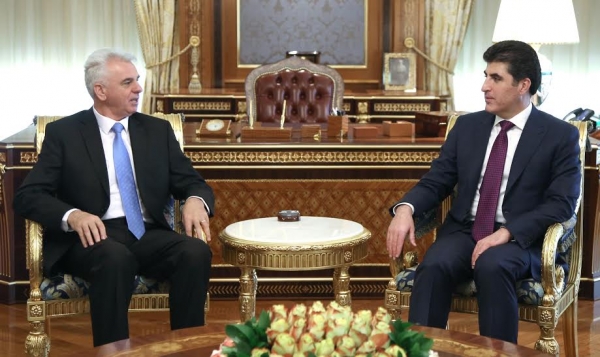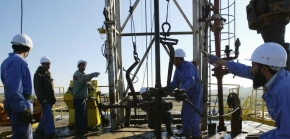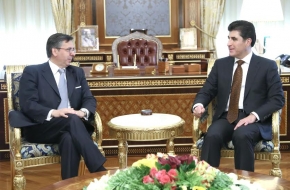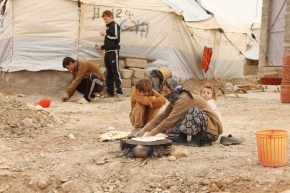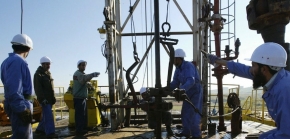PM Barzani receives US Chief of Office of Security Cooperation in Iraq and his successor
Erbil, Kurdistan Region, Iraq (cabinet.gov.krd) - Kurdistan Region Prime Minister, Nechirvan Barzani yesterday received Lt. Gen. Mick Bednarek, the United States Chief of Office of Security Cooperation-Iraq, and his accompanying military and diplomatic delegation.
General Bednarek visited Prime Minister on the occasion of termination of his duty in Iraq and introduce his successor, Major General Paul LaCamera.
General Bednarek thanked Kurdistan Regional Government, KRG, the Ministry of Peshmerga, and Peshmerga forces, who, he said, have offered full cooperation and assistance during his mission.
General Bednarek commended the role played by Peshmerga forces in confronting Islamic State terrorist organisation, ISIS, stressing the continuation of the United States support to the Peshmerga forces.
The situation of different areas of Iraq, particularly the areas under the control of ISIS, as well as the current and future cooperation among the coalition, Iraqi and Peshmerga forces were also discussed.
Prime Minister Barzani thanked General Bednarek, who during the past two years has fulfilled his duty effectively in Iraq and Kurdistan Region. He expressed his wishes of success in his new position.
Prime Minister Barzani meanwhile welcomed Major General Paul LaCamera, reiterating the cooperation and coordination of Kurdistan Region Peshmerga and security forces with his office.
He expressed his gratitude to the coalition forces, particularly the United States forces that have played a significant role in repulsing terrorist threats from Kurdistan Region.
Croatia to develop its representation in the Kurdistan Region
Erbil, Kurdistan Region, Iraq (cabinet.gov.krd) - Kurdistan Region Prime Minister, Nechirvan Barzani, yesterday received Croatia's Ambassador to Iraq, Ambassador Jerko Vukas and his accompanying delegation.
Ambassador Vukas expressed his appreciation for the victories achieved by Kurdistan Region Peshmerga forces on the battlefield against terrorism.
He expressed his country's desire to open its diplomatic mission in the Kurdistan Region and develop diplomatic, economic, commercial and cultural relations with the Kurdistan Region.
In this regard, Ambassador Vukas handed a formal invitation from his government to Prime Minister Barzani to visit Croatia.
For his part, Prime Minister Barzani reaffirmed that the Kurdistan Region desires developing and strengthening bilateral relations with the government and people of Croatia.
He accepted the invitation, stressing that he will pay an official visit to Croatia in a near future.
Prime Minister Barzani recalled the visit by the Croatian Deputy Prime Minister and Minister of Foreign and European Affairs to the Kurdistan Region earlier this year, which, he said, marked developing bilateral relations.
June Report - KRG increases its direct oil sale
Erbil, Kurdistan Region, Iraq (cabinet.gov.krd/mnr.gov.krd) - Kurdistan Regional Government, KRG, has increased its direct oil sale in June due to the "significant debt backlog arising from the budget cuts of 2014 imposed by the federal government, and the need to pay down debts accumulated in 2014 from pre-payments for oil sales”, KRG Ministry of Natural Resources said in its June Export Report.
Due to these difficulties, the KRG Ministry of Natural Resources has been obliged to increase its independent oil sale, the report said.
According to the report, KRG tanks in Ceyhan port in Turkey received 17,130,639 barrels of crude oil (an average of 571,021 barrels per day, bpd) in June, through the Kurdistan pipeline network to the port of Ceyhan in Turkey.
Fields operated by the KRG contributed 12,740,711 barrels (an average of 424,690 bpd), while fields operated by the North Oil Company, NOC, contributed 4,389,928 barrels (an average of 146,331 bpd).
In June, KRG supplied 4,493,334 barrels (an average of 149,778 bpd) to Iraq’s State Oil Marketing Company, SOMO, in Ceyhan.
According to the KRG Ministry of Natural Resources Report, the KRG has indepemdently sold 11,893,231 barrels in June.
Following the budget cut imposed by Bagdad early 2014, KRG largely relied on international and local loans in securing the Region’s civil servants salaries and public services spendings.
Kurdistan Region financial difficulties continued in 2015, as the Iraqi Federal Government has, to date, failed to abide by its agreement with KRG reached last December on oil export and budgetary issues.
According to the December agreement, KRG is committed to export 550,000 bpd in return for a budget entitlement close to one billion US dollars per month to be paid by the federal government. The agreement was approved within the framework of the Iraqi Federal Budget Law for 2015.
KRG Ministry of Natural Resources June Report emphasises that, “In 2015, the difficult economic situation facing the Region has been exacerbated by the partial payments made to the KRG by the Federal Government.”
Although, KRG independent oil sales has increased, the report stresses that KRG remains committed to the 2015 Federal Budget Law in its entirety.
“[The KRG] will continue to work with its counterparts in Baghdad to reach a resolution on all the outstanding issues of oil and gas as described in the joint statement of June 17, 2015 by the KRG’s Regional Council for Oil and Gas Affairs and the five political parties in the Kurdistan Regional Government”, the report said.
In a statement issued following a joint meeting on June 17, between KRG Regional Council for Oil and Gas and the five political parties in Kurdistan Regional Government, it was stressed that, “If the Federal Government does not abide by the Federal Budget Law, the KRG will be obliged to pursue other legal solutions to settle Kurdistan Region’s financial difficulties and provide the Region’s people with security and other basic necessities in light of Law No 5 of 2013 of the Kurdistan Parliament.”
Italy continues its support to Kurdistan Region
Erbil, Kurdistan Region, Iraq (cabinet.gov.krd) - Kurdistan Region Prime Minister, Nechirvan Barzani, yesterday received Italian Ambassador to Iraq, Marco Carnelos, and his accompanying delegation.
Ambassador Carnelos praised the role of the Peshmerga forces who confront the Islamic State terrorist organisation, ISIS, on behalf of the entire world, reiterating his government’s support to Kurdistan Region in the war against terrorism.
He stressed that he will work to strengthen the relations between Italy and Kurdistan Region in all fields, particularly in military, humanitarian, and economic domains.
Ambassador Carnelos reiterated his support for the settlement of the issues between Kurdistan Region and Baghdad.
Prime Minister Barzani thanked Ambassador Carnelos for his visit, saying “It is an honour for the Kurdistan Region that its Peshmerga forces fight ISIS on behalf of the entire world.”
He expressed his gratitude to the Italian government, as it was among the countries that had helped the Kurdistan Region since the early days when it started confronting ISIS. He said the visit by Italian Prime Minister was the best support.
Regarding relations between Kurdistan Region and Baghdad, Prime Minister Barzani stressed the necessity of settling the issues through dialog and negotiations.
Kurdistan Region needs further support for IDPs and refugees
Erbil, Kurdistan Region, Iraq (cabinet.gov.krd) – The Kurdistan Regional Government, KRG, has been struggling to provide adequate humanitarian assistance to an overwhelming number of Iraqi internally displaced persons, IDPs, and Syrian refugees.
However, according to the KRG Ministry of Planning, the Kurdistan Region needs further assistance from United Nation agencies and the international community in order to be able to continue providing such assistance.
Director General for Capital Investment and Budget in the KRG Ministry of Planning, Mr. Zagros Fattah, told the KRG website that the financial burden on the KRG has increased dramatically and it can hardly afford to provide adequate assistance to the already settled over 1.5 million refugees and IDPs, who have sought refuge in the Kurdistan Region.
He warned that additional IDPs are anticipated as military efforts are taken to liberate Mosul and other places currently under the domination of the Islamic State terrorist organization, ISIS. Despite the best efforts made by the KRG, it is beyond its capacity to adequately meet the basic humanitarian needs of all IDPs and refugees.
“Although the Federal Government of Iraq claims it lacks funds to assist the IDPs, it seems there is no political will to do so. Internally displaced families are fragile Iraqi nationals and it is the utmost duty and responsibility of the Iraqi Federal Government to support the KRG in providing assistance to them,” Zagros Fattah said.
Most displaced people arrived in 2014 during a time when the KRG was facing severe financial difficulties. The Iraqi Federal Government stopped providing the KRG its share of national revenue, as earlier agreed.
According to a World Bank report published in February 2015, Baghdad’s refusal to send the Kurdistan Region budget in 2014, combined with the refugee and IDP crisis, adversely impacted all productive and social sectors in Kurdistan Region. "Together the wave of refugees and IDPs exerted a huge pressure on the KRG as it exceeds 28 percent of its own population", said the World Bank report.
The World Bank projected the KRG needs US$ 1.4 billion to stabilize the influx of displaced people at the current level, without allowing for additional IDPs. If 300,000 additional IDPs flee to the Kurdistan Region this projection could rapidly rise to over US$ 2 billion.
According to the UNHCR Global Appeal 2015 Report, “The escalation of armed conflict across the central governorates of Iraq, and the constantly changing security situation, have resulted in new and secondary movements of internally displaced people across central Iraq and the Kurdistan Region of Iraq”.
In a joint statement by the KRG and United Nations on 26 March 2015, Deputy Special Representative of the UN Secretary-General for the UN Assistance Mission for Iraq as well as UN Resident and Humanitarian Coordinator for Iraq, Lise Grande, stated that, “This is a major humanitarian emergency. It’s imperative that we as the international community support the Kurdistan Regional Government in assisting the victims of ISIL.”
Since the liberation of Tikrit, according to the Head of Emergency Committee in Sulaymanya Governorate, Aziz Sofi, an additional 3,000 families fled from Anbar and sought safety in the governorate.
“Although Tikrit is now liberated, but no family is willing to return to the city due to security concern”, said Sofi.
According to the latest International Organisation for Migration, IOM, report published in April, 28,170 additional IDPs fled to Erbil Governorate and 3,042 to Duhok Governorate.
April Report: Kurdistan Region oil production at record level, export commitments met
Erbil, Kurdistan Region, Iraq (cabinet.gov.krd) - According to the April 2015 report published by the Kurdistan Regional Government, KRG, Ministry of Natural Resources, KRG commitments under the 2015 Federal Budget Law have been met, and oil production has reached record levels.
According to an agreement on oil export and budget, reached last December between the KRG and the Federal Government of Iraq, Kurdistan Region is committed to export 550,000 bpd (barrels per day) in return for a budget entitlement close to one billion US dollars per month to be paid by the federal government. The agreement was approved within the framework of the Iraqi Federal Budget Law for 2015.
In April, the Kurdistan Regional Government delivered to the Iraqi State Oil Marketing Company, SOMO, a total 16,878,985 barrels for an average of 562,633 bpd.
Kurdistan Region oilfields supplied 12,457,371 barrels averaging 415,246 bpd, while North Oil Company (NOC) oilfields, Kirkuk, supplied 4,421,614 barrels averaging 147,387 bpd. Oil from both sources is exported through a KRG pipeline to the Turkish oil export facility at Ceyhan.
In March the KRG published cumulative export data, noting that while it met its oil export commitments, the KRG has yet to receive its full entitlement per agreement under the Federal Budget Law of 2015.
Last week, in two separate meetings, the Kurdistan Region Prime Minister and a number of members of the Council of Ministers, met Kurdistan Region Baghdad representatives, and the Speaker of the Kurdistan Parliament along with Parliamentary groups.
The Prime Minister reaffirmed KRG’s commitment to the December agreement and the Iraqi 2015 Federal Budget Law. He pointed out, however, that if talks with Baghdad do not produce positive results and Baghdad continues its breach of the Federal Budget Law, then the KRG will have to consider other options to stabilise the Region’s financial security.
PM Barzani and UN Special Representative discuss Baghdad-Kurdistan Region agreement
Erbil, Kurdistan Region, Iraq (cabinet.gov.krd) - Kurdistan Region Prime Minister yesterday received United Nations Special Representative for Iraq, Ján Kubiš and his accompanying delegation.
The meeting focused on the agreement, signed last December, between Kurdistan Regional Government, KRG, and the Federal Government of Iraq on oil export and budget, as well as Iraq’s 2015 Budget Law. It highlighted Kurdistan Region’s commitment to the agreement.
Prime Minister Barzani expressed his concern for the fact that the Federal Government of Iraq has not been honouring its commitment to the agreement with Kurdistan Region.
He pointed out that the agreement was reached following appeal and support from United Nations, United States and United Kingdom. He urged the three sides to play their role and urge Baghdad to meet its obligations under the agreement and the Budget Law.
In another part of the meeting, the two sides emphasised on further cooperation between United Nation agencies and Kurdistan Regional Government, particularly in dealing with possible increase in numbers of internally displaced people.
They reaffirmed the necessity of further commitment of the international community in assisting Kurdistan Region relevant institutions and United Nations agencies, particularly those which work in humanitarian fields.
The two sides also discussed the latest developments in Iraq, the situation in Anbar Province, and the security situation in the region in general.
Italy will continue its assistance to Kurdistan Region
Erbil, Kurdistan Region, Iraq (cabinet.gov.krd) - Kurdistan Region Prime Minister, Nechirvan Barzani, yesterday received Italy's Ambassador to Iraq, Massimo Moratti and his accompanying delegation, who visited Prime Minister Barzani on the occasion of ending his duties in Iraq.
Mr Morrati pointed to the assistance that the Italian government provides to the people and government of Kurdistan Region, particularly humanitarian assistance and training of the Peshmerga forces, stressing that Italy’s assistance to the Kurdistan Region will continue.
Prime Minister Barzani thanked Mr. Morrati and praised his role as Italy’s ambassador to Iraq, who has been able to contribute to the establishment of solid relations between Kurdistan Region and Italy, and deliver the true image of the Region to his and European countries. He wished success to Mr. Morrati in his future position.
Prime Minister Barzani recalled that those visits by Italian senior delegations to Kurdistan Region, particularly during difficult times, are being highly appreciated.
He reiterated that the threat of the Islamic State terrorist organisation, ISIS, has not been eliminated, which is why it is essential to continue cooperation between the two sides.
Jegarkhwein Talks with Kurd Press: Kurdistan Region of Iraq is an Opportunity for Iran
In a talk with Kurd press, Jegarkhwein dealt with reviewing different concerns including economic political problems and their causes in Kurdistan Region and Iraq, the cause of Iran’s weak presence in Kurdistan Region’s market as compared to Turkey, the political-historical relations between Iran and Kurdistan Region of Iraq and the necessity of improving the cultural-scientific relations between them. A short description follows:
In his view the crises compose of a collection of threats and chances. He believes that presently two crises, ISIS and financial concerns, are the problems Kurdistan Region of Iraq. Concerning fighting terrorism of quasi-government of ISIS, Pishmerga forces managed to courageously fire the terrorists from almost all occupied areas, and now in all battlefields Pishmergas has taken the control. Relating to financial crisis I do insist that the cause of this is undoubtedly the former Iraq cabinet, of course, terrorists’ strike made it worse. He continued to say that one of the roots of current problems of Iraq is the way it formed as a country. Iraq without deeming the identical joints of tribes was formed by great powers. That was why a national identity has never been formed in Iraq. Furthermore, mentioning the concern of physical existence of Iraq he believes that all social political opportunities have to be used in order to resolve this problem.
In a response to a question, Jegarkhwein said that the oil transition pipeline of the Region passes through Turkey. However, as Qassem Rostami, the chief of Economic Improvement Centre of Iran-Iraq and senior consultant of first vice-president of Islamic Republic of Iran traveled Erbil, some agreements were reached of which one relates to energy matter. In addition he continued that the officials of the Region have a balance look toward the relations with neighbors.
The deputy-representative of KRG of Iraq in Iran believes that Iran has entered good and beneficial market of the Region late, thus it has missed many chances. In his view this condition has appeared that between both sides there are numerous historical, cultural, social joints.
Relating to the strategy of the Region concerning gaining the Independence from Iraq, Jegarkhwein refers to a phrase of the head of the Region saying that this process (the Independence) is still going, although fighting ISIS has postponed this. This is meant that we cannot relinquish, however; we want to accomplish that without force, fighting and bleeding, with our unity, research, wisdom and talking with Baghdad.
About sayings put concerning better relation of Kurdistan Democratic Party with Turkey and Patriotic Union with Iran he said he would not accept this in this way; since the relations among Kurdistan Region, Iran, Iraq and other countries are not in the form of Party but formal and almost diplomatic. The foreign relations mechanisms of the Region are not bound to any party and operate completely nationally.
Relating to Iran support from the Region against ISIS Jegarkhwein said that Iran is an important and great neighbor. The leaders of Kurdistan Region as the representative of their nation are always appreciating Iran generous supports and helps. It can be said that after Islamic republic triumph, our relation with Iran have been warm and close all times but a short time long ago. He continued to mention a few aids of Iran to Kurdistan Region of Iraq.
The deputy-representative of KRG of Iraq in Iran in a response to the last question relating to current obstacles to improve the relations between Iran and the Region answered clearly and elaborately. In general in his view matters like Iran-phobia for some Kurds in the Region and Kurd-phobia for some Iranian officials, limited Iranian authorities’ welcoming to improve the relations with Kurdistan Region, preventing scholar and culture cooperation on the behalf of Iranian officials, not caring to the public diplomacy by both sides to improve the relations have made obstacles. Finally he put an end to his interview by say this that: deep and the strategic relations in the fields of culture, economic and sociology can cause trustful perspective of relations in all cases.
Nazem Dabbagh Strongly Denied the News of Masoud Barzani’s Death
Nazem Dabbagh the representative of Kurdistan regional Government of Iraq in Iran strongly denied of the news of Masoud Barezani’s death on some Medias. According to the report of international group of Fars, KurdPress News Agency quoted by Nazem Dabbagh the representative of KRG strongly denied Masoud Barzani’s death. Kurdpress printed: while today, Tuesday, June 9th, some Medias of Iraq published news based on Masoud Barzani’s death the head of KRG a result of cerebral stroke, nazem Dabbagh strongly denied the news.
While talking with Kurdpress News Agency, Nazem Dabbagh declared that the news is fully false and untrue; publishing such false is an attempt on the behalf of Kurds’ enemy and Masoud Barezani is in good and healthy condition.
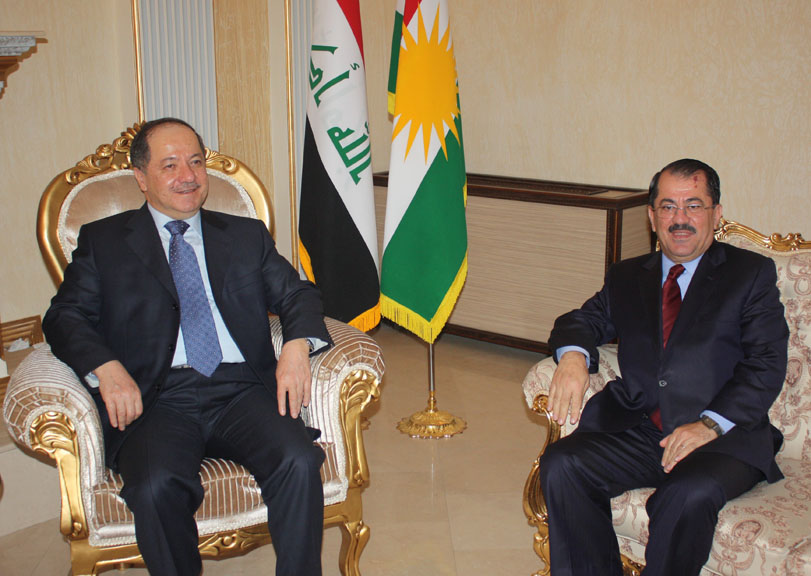
Nazem Dabbagh in talk with Ana News Agency: Enemy will not Achieve its Goals
The representative of KRG of Iraq in Iran in talk with Ana News Agency denied the news of Masoud Barzani’s death.
According to the international group of Ana News Agency, hours ago news resources of Iraq reported the death of Masoud Barzani the head of KRG; which Nazem Dabbagh the representative of KRG of Iraq in Iran relating this said to Ana News Agency: the news is not true and is an absolute falsity. He continued: this lie is the purpose for enemy, and we address them that you will not achieve your goal, causing differences in KR.
More...
Latest News
- President Erdoğan reaffirms Türkiye’s continued support for Iraq and the Kurdistan Region
- President Nechirvan Barzani’s message on the 126th anniversary of Kurdish journalism
- President Nechirvan Barzani at the Sulaimani Forum: The country must bring us all together
- President Nechirvan Barzani meets with European Union Ambassador
- President Nechirvan Barzani receives French Ambassador
- President Nechirvan Barzani visits Iranian Consulate General to pay respects to victims of Kerman terrorist attack
- President Nechirvan Barzani receives outgoing French Ambassador
- President Nechirvan Barzani condemns terrorist bombings in Iran
- President Nechirvan Barzani meets with US Deputy Secretary of State
- President Nechirvan Barzani’s New Year Address
- KRG Prime Minister Meets with US Deputy Secretary of State
- KRG Prime Minister Engages in Key Talks with UNAMI Chief
- KRG Prime Minister Hosts Diplomats from Iraq and Kurdistan Region
- KRG Prime Minister Meets with the UN’s Secretary-General at COP28
- President Nechirvan Barzani meets with Turkish Ambassador
- KRG Prime Minister Welcomes UK Military Delegation
- President Nechirvan Barzani meets with UK Chief of the Defense Staff’s Senior Middle East Advisor
- KRG Prime Minister Discusses Regional Issues and Domestic Policies in Special Panel
- KRG Prime Minister Meets with Former British Prime Minister
- MEPS Forum in Duhok Highlights Climate Change Among Key Global Challenges
- KRG Prime Minister Meets with United Nations Delegation
- President Nechirvan Barzani and French Ambassador discuss the situation in Iraq and the region
- President Nechirvan Barzani meets with Head of the Independent Strategic Review of UNAMI
- KRG Prime Minister Inaugurates 5th International Trade Fair for Industry and Construction
- KRG Prime Minister Meets Qatar's Consul General
- President Nechirvan Barzani meets with Iraq’s Oil Minister
- KRG Prime Minister Welcomes Cardinal Sako of the Chaldean Catholic Church
- KRG Prime Minister Meets with Iraq's Energy Officials
- KRG Prime Minister Meets with British Ambassador
- President Nechirvan Barzani meets with UK Ambassador to Iraq

